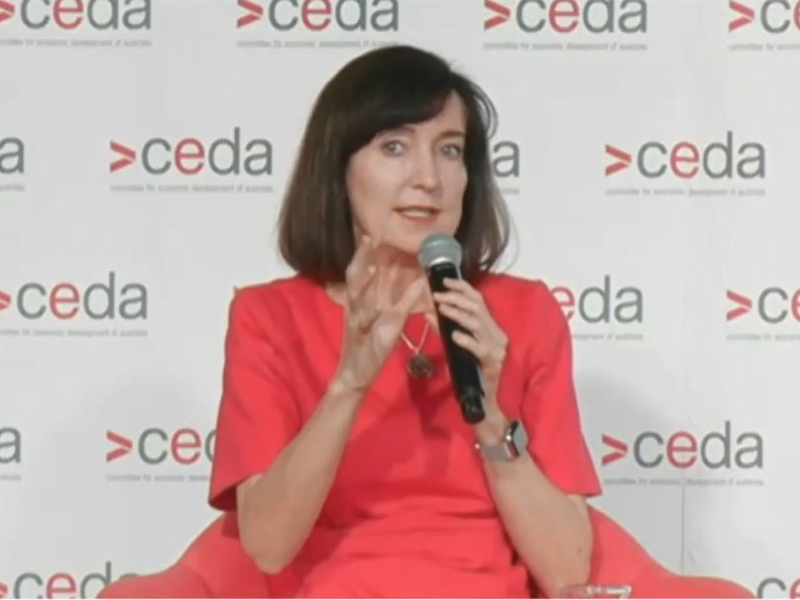South Australian Deputy Premier Susan Close has encouraged the space sector not to overlook applications of space tech that can help manage the effect of climate change as space militarisation and commercialisation grows.
Dr Close made the comments at a seminar hosted by the Committee for Economic Development of Australia (CEDA) on Thursday in Adelaide. She is also the Minister for Industry, Innovation and Science, as well as the Minister for Defence and Space Industries.
Dr Close told attendees of the session the potential of space tech to help mitigate and manage climate change should not be overlooked, especially as the “defence element becomes very noisy, understandably,” and a lot of investment is made through commercialisation of space.

“I think there’s a risk that space becomes highly militarised and contested, that’s a pathway you can imagine happening particularly with the global tensions right now. There’s also a challenge that the commercialisation of space means that the chase of profit becomes a dominant theme in how we use this technology,” Dr Close said.
“Space can be such a huge part of not just telling us that we’re warming and that we’re drying, but in the management of the warming that’s happening. We’re going to have a more energetic atmospheric system for a long time to come. It’s just a question of how much,” she said.
“And the capacity of space [technology] to be able to help us actively manage the flood events, so that humans are able to move out of the way, and the other natural disasters that are inherent already in the warming in the system that isn’t going to go away.
“But then just over the horizon, the question of whether we have to start doing terraforming responses. Do we have to start actively interfering with the atmosphere to counterbalance [climate change]? These are really big debates to be had. Let’s not lose sight of a shared challenge that space could be, possibly, the most important sector for dealing with challenges,” Dr Close said.
Also speaking on the CEDA panel were the Head of the Australian Space Agency (ASA) Enrico Palermo, NASA Deputy Administrator Pamela Melroy, and the Defence Space Command’s Space Forces Director Group Captain Darrell May, who substituted for Covid-stricken Acting Commander of Defence Space Command Brigadier Christopher Gardiner.
Mr Palermo said that the world sees Australia as a natural partner in the space sector, given the proximity of its launch sites to the equator. He also added the value for the space sector in Australia also stems from strong deep tech education and research programs run at Australian universities.
He said that although Australia doesn’t have a problem in generating talent to lead successful space companies and fill leadership roles in the world’s biggest space agencies, the country needs a more diverse pipeline of talent.
“We need more systems engineers we need more program managers, we need more space scientists, but we also need the skills to assemble sophisticated technology, so it also proceeds into the vocational side of things,” Mr Palermo said.
“We sort of colloquially say ‘space tradies’, whether it’s people who can do friction stir welding or build wiring harnesses. These are all transferable, fortunately to other sectors, but it’s not just degree qualified professionals it’s also technicians and very skilled labour is required.”
As a regulator, Mr Palermo said the ASA is developing a framework for manned space launches from Australian soil, which not yet exists.
Ms Palermo described Australia as having a “huge impact on the global stage in space policy” as one of the original developers and signatories to the Artemis accords in 2020. These outline principles for peaceful civil cooperation for space exploration and use.
Mr Palermo also encouraged attendees to take a long-term approach to space sector development. He described the federal government’s National Space Mission to launch four satellites as the first phase in the government’s support for developing the space sector and called for procurement programs of 10 years or more that can help build the confidence to invest.
Dr Close added that she doesn’t want to see Australia just have the “allen keys that put together the bits that someone else has made”.
“The way that we get technological spillover from these very big projects is very sophisticated projects in space and defence is if we are able to have an array of companies feeding in,” Dr Close said.
Group Captain May said that collaboration in the space sector was as important as building capabilities domestically. In particular, Group Captain May emphasised the need for sharing capabilities across allied countries and industry.
“If all the data is going back to one nation, then when you start to look at the potential for an adversary to cut off access to that. Having that redundancy of data in particular and capability launch sites, other providers of payloads, [intelligence, surveillance, and reconnaissance] capability, [satellite communication] capabilities, all of that requires redundancy and resilience in the system,” Group Captain May said.
He also said that sovereign capability is a term that can “mean anything from completely developed in Australia to partnerships that occur with allies”.
According to Group Captain May the immediate priorities for Defence Space Command should be on getting data, getting people involved in the space sector, and developing the capabilities to launch, fly, and perform orbital analysis on spacecraft.
Do you know more? Contact James Riley via Email.

